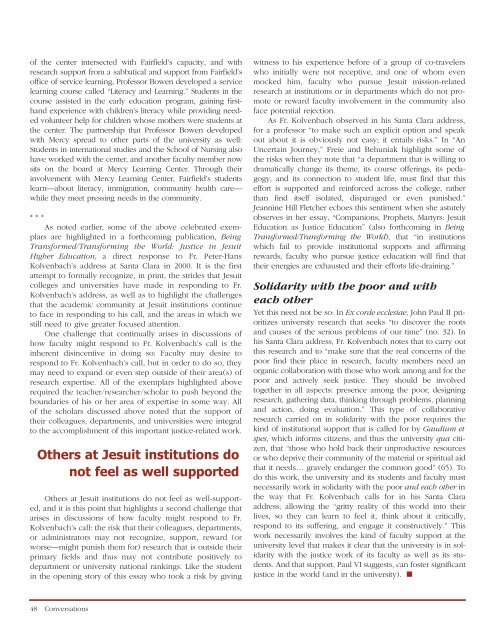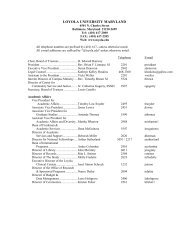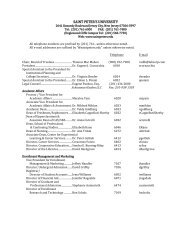to download it today - Association of Jesuit Colleges and Universities
to download it today - Association of Jesuit Colleges and Universities
to download it today - Association of Jesuit Colleges and Universities
You also want an ePaper? Increase the reach of your titles
YUMPU automatically turns print PDFs into web optimized ePapers that Google loves.
<strong>of</strong> the center intersected w<strong>it</strong>h Fairfield’s capac<strong>it</strong>y, <strong>and</strong> w<strong>it</strong>h<br />
research support from a sabbatical <strong>and</strong> support from Fairfield’s<br />
<strong>of</strong>fice <strong>of</strong> service learning, Pr<strong>of</strong>essor Bowen developed a service<br />
learning course called “L<strong>it</strong>eracy <strong>and</strong> Learning.” Students in the<br />
course assisted in the early education program, gaining firsth<strong>and</strong><br />
experience w<strong>it</strong>h children’s l<strong>it</strong>eracy while providing needed<br />
volunteer help for children whose mothers were students at<br />
the center. The partnership that Pr<strong>of</strong>essor Bowen developed<br />
w<strong>it</strong>h Mercy spread <strong>to</strong> other parts <strong>of</strong> the univers<strong>it</strong>y as well:<br />
Students in international studies <strong>and</strong> the School <strong>of</strong> Nursing also<br />
have worked w<strong>it</strong>h the center, <strong>and</strong> another faculty member now<br />
s<strong>it</strong>s on the board at Mercy Learning Center. Through their<br />
involvement w<strong>it</strong>h Mercy Learning Center, Fairfield’s students<br />
learn—about l<strong>it</strong>eracy, immigration, commun<strong>it</strong>y health care—<br />
while they meet pressing needs in the commun<strong>it</strong>y.<br />
* * *<br />
As noted earlier, some <strong>of</strong> the above celebrated exemplars<br />
are highlighted in a forthcoming publication, Being<br />
Transformed /Transforming the World: Justice in Jesu<strong>it</strong><br />
Higher Education, a direct response <strong>to</strong> Fr. Peter-Hans<br />
Kolvenbach’s address at Santa Clara in 2000. It is the first<br />
attempt <strong>to</strong> formally recognize, in print, the strides that Jesu<strong>it</strong><br />
colleges <strong>and</strong> univers<strong>it</strong>ies have made in responding <strong>to</strong> Fr.<br />
Kolvenbach’s address, as well as <strong>to</strong> highlight the challenges<br />
that the academic commun<strong>it</strong>y at Jesu<strong>it</strong> inst<strong>it</strong>utions continue<br />
<strong>to</strong> face in responding <strong>to</strong> his call, <strong>and</strong> the areas in which we<br />
still need <strong>to</strong> give greater focused attention.<br />
One challenge that continually arises in discussions <strong>of</strong><br />
how faculty might respond <strong>to</strong> Fr. Kolvenbach’s call is the<br />
inherent disincentive in doing so: Faculty may desire <strong>to</strong><br />
respond <strong>to</strong> Fr. Kolvenbach’s call, but in order <strong>to</strong> do so, they<br />
may need <strong>to</strong> exp<strong>and</strong> or even step outside <strong>of</strong> their area(s) <strong>of</strong><br />
research expertise. All <strong>of</strong> the exemplars highlighted above<br />
required the teacher/researcher/scholar <strong>to</strong> push beyond the<br />
boundaries <strong>of</strong> his or her area <strong>of</strong> expertise in some way. All<br />
<strong>of</strong> the scholars discussed above noted that the support <strong>of</strong><br />
their colleagues, departments, <strong>and</strong> univers<strong>it</strong>ies were integral<br />
<strong>to</strong> the accomplishment <strong>of</strong> this important justice-related work.<br />
Others at Jesu<strong>it</strong> inst<strong>it</strong>utions do<br />
not feel as well supported<br />
Others at Jesu<strong>it</strong> inst<strong>it</strong>utions do not feel as well-supported,<br />
<strong>and</strong> <strong>it</strong> is this point that highlights a second challenge that<br />
arises in discussions <strong>of</strong> how faculty might respond <strong>to</strong> Fr.<br />
Kolvenbach’s call: the risk that their colleagues, departments,<br />
or administra<strong>to</strong>rs may not recognize, support, reward (or<br />
worse—might punish them for) research that is outside their<br />
primary fields <strong>and</strong> thus may not contribute pos<strong>it</strong>ively <strong>to</strong><br />
department or univers<strong>it</strong>y national rankings. Like the student<br />
in the opening s<strong>to</strong>ry <strong>of</strong> this essay who <strong>to</strong>ok a risk by giving<br />
48 Conversations<br />
w<strong>it</strong>ness <strong>to</strong> his experience before <strong>of</strong> a group <strong>of</strong> co-travelers<br />
who in<strong>it</strong>ially were not receptive, <strong>and</strong> one <strong>of</strong> whom even<br />
mocked him, faculty who pursue Jesu<strong>it</strong> mission-related<br />
research at inst<strong>it</strong>utions or in departments which do not promote<br />
or reward faculty involvement in the commun<strong>it</strong>y also<br />
face potential rejection.<br />
As Fr. Kolvenbach observed in his Santa Clara address,<br />
for a pr<strong>of</strong>essor “<strong>to</strong> make such an explic<strong>it</strong> option <strong>and</strong> speak<br />
out about <strong>it</strong> is obviously not easy; <strong>it</strong> entails risks.” In “An<br />
Uncertain Journey,” Freie <strong>and</strong> Behuniak highlight some <strong>of</strong><br />
the risks when they note that “a department that is willing <strong>to</strong><br />
dramatically change <strong>it</strong>s theme, <strong>it</strong>s course <strong>of</strong>ferings, <strong>it</strong>s pedagogy,<br />
<strong>and</strong> <strong>it</strong>s connection <strong>to</strong> student life, must find that this<br />
effort is supported <strong>and</strong> reinforced across the college, rather<br />
than find <strong>it</strong>self isolated, disparaged or even punished.”<br />
Jeannine Hill Fletcher echoes this sentiment when she astutely<br />
observes in her essay, “Companions, Prophets, Martyrs: Jesu<strong>it</strong><br />
Education as Justice Education” (also forthcoming in Being<br />
Transformed/Transforming the World), that “in inst<strong>it</strong>utions<br />
which fail <strong>to</strong> provide inst<strong>it</strong>utional supports <strong>and</strong> affirming<br />
rewards, faculty who pursue justice education will find that<br />
their energies are exhausted <strong>and</strong> their efforts life-draining.”<br />
Solidar<strong>it</strong>y w<strong>it</strong>h the poor <strong>and</strong> w<strong>it</strong>h<br />
each other<br />
Yet this need not be so: In Ex corde ecclesiae, John Paul II prior<strong>it</strong>izes<br />
univers<strong>it</strong>y research that seeks “<strong>to</strong> discover the roots<br />
<strong>and</strong> causes <strong>of</strong> the serious problems <strong>of</strong> our time” (no. 32). In<br />
his Santa Clara address, Fr. Kolvenbach notes that <strong>to</strong> carry out<br />
this research <strong>and</strong> <strong>to</strong> “make sure that the real concerns <strong>of</strong> the<br />
poor find their place in research, faculty members need an<br />
organic collaboration w<strong>it</strong>h those who work among <strong>and</strong> for the<br />
poor <strong>and</strong> actively seek justice. They should be involved<br />
<strong>to</strong>gether in all aspects: presence among the poor, designing<br />
research, gathering data, thinking through problems, planning<br />
<strong>and</strong> action, doing evaluation.” This type <strong>of</strong> collaborative<br />
research carried on in solidar<strong>it</strong>y w<strong>it</strong>h the poor requires the<br />
kind <strong>of</strong> inst<strong>it</strong>utional support that is called for by Gaudium et<br />
spes, which informs c<strong>it</strong>izens, <strong>and</strong> thus the univers<strong>it</strong>y qua c<strong>it</strong>izen,<br />
that “those who hold back their unproductive resources<br />
or who deprive their commun<strong>it</strong>y <strong>of</strong> the material or spir<strong>it</strong>ual aid<br />
that <strong>it</strong> needs… gravely endanger the common good” (65). To<br />
do this work, the univers<strong>it</strong>y <strong>and</strong> <strong>it</strong>s students <strong>and</strong> faculty must<br />
necessarily work in solidar<strong>it</strong>y w<strong>it</strong>h the poor <strong>and</strong> each other in<br />
the way that Fr. Kolvenbach calls for in his Santa Clara<br />
address; allowing the “gr<strong>it</strong>ty real<strong>it</strong>y <strong>of</strong> this world in<strong>to</strong> their<br />
lives, so they can learn <strong>to</strong> feel <strong>it</strong>, think about <strong>it</strong> cr<strong>it</strong>ically,<br />
respond <strong>to</strong> <strong>it</strong>s suffering, <strong>and</strong> engage <strong>it</strong> constructively.” This<br />
work necessarily involves the kind <strong>of</strong> faculty support at the<br />
univers<strong>it</strong>y level that makes <strong>it</strong> clear that the univers<strong>it</strong>y is in solidar<strong>it</strong>y<br />
w<strong>it</strong>h the justice work <strong>of</strong> <strong>it</strong>s faculty as well as <strong>it</strong>s students.<br />
And that support, Paul VI suggests, can foster significant<br />
justice in the world (<strong>and</strong> in the univers<strong>it</strong>y). �




